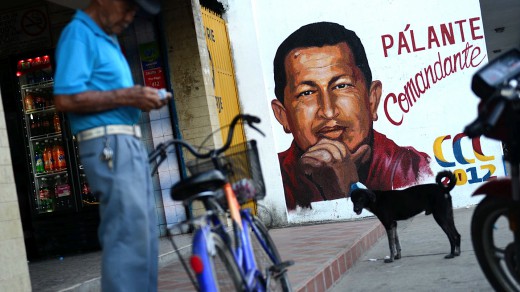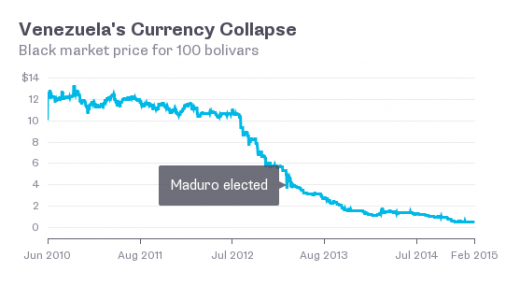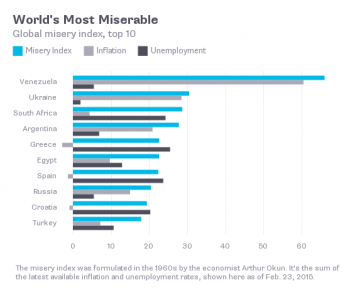By Nathan Crooks for Bloomberg

Venezuela has more oil than Saudi Arabia and more poverty than Brazil. As the world’s only left-wing petrostate, it hopes to light a revolutionary path to prosperity for Latin America’s poor. The country’s an economic and social mess, though, with inflation pushing 70 percent, the world’s highest rate, and a homicide rate second only to Honduras.
With the price of oil falling by half in the second half of 2014, the legacy of the late President Hugo Chavez is at risk as his hand-picked successor, Nicolas Maduro, struggles to keep providing cheap oil and other subsidies to buy influence abroad and popular support at home. Citizens wait in long lines to find scarce household items from deodorant to toilet paper. Congressional elections expected later this year will give Maduro’s government its first major electoral test.
The Situation
With oil revenue accounting for 95 percent of the country’s foreign currency earnings and an economy that produces little else, the Caribbean nation of 30 million people found itself with 60 percent less cash from its exports at the start of 2015 than it received just six months before. That’s making it harder for the country to import the goods it needs.
Since being elected in 2013 with the narrowest margin in 45 years, Maduro — a former bus driver, union leader, foreign minister and vice president — has promised, and then struggled to deliver, reforms to the country’s strict currency controls.
He’s also stepped up attacks on foreign news media and arrested political opponents. Sporadic street protests broke out in February as opposition-affiliated students tried to commemorate last year’s rallies against Maduro, which left 43 people dead.
The country’s U.S. dollar bonds have gone from being among the best-performing in the world to the worst amid concerns about a possible default. The currency, the bolivar, has declined almost 90 percent on the black market since Maduro’s election.

The Background
A former paratrooper jailed for two years after leading a failed coup in 1992, Chavez revolutionized Venezuelan politics after he was elected president in 1998 with fiery anti-U.S. rhetoric. He nationalized thousands of companies or their assets, reducing the economy’s capacity to produce anything but oil. He channeled revenue to the poor and expanded
Venezuela’s influence in the region by doling out $8 billion a year of cheap oil. He used widespread electoral support to transform a pluralistic democracy into a largely authoritarian system. Extreme poverty fell and his friends and allies were enriched. After a 2002 coup removed Chavez from power for 48 hours, he radicalized what he called his “Bolivarian Revolution,” named after Venezuela’s 19th-century liberator Simon Bolivar.
Strict currency controls that overvalue the bolivar and provide cheap dollars for government-approved imports started in 2003. Chavez maintained a deep connection with his supporters, frequently polling above 50 percent and winning re-election three times.
Maduro has struggled for popularity. His approval rating fell to 22 percent at the start of 2015, and inflation is pushing millions back into poverty. As oil revenue plunges, he’s been reluctant to cut subsidies at home or abroad and has instead traveled the world looking for loans.

The Argument
Maduro was facing high inflation, corruption and product shortages well before oil prices began to fall in June 2014, not to mention widespread violent crime. He’ll have little time to decide between cutting subsidies, defaulting on sovereign debt, or hoping to ride things out by securing fresh loans from China.
What remains to be seen is whether people will be patient. With opposition politicians clamoring for his resignation and Venezuelans struggling to feed their families, the margin for error is razor thin.
Bron: Bloomberg


“The price of revolution” … and of ignorance, zou ik zeggen.
Daar hebben de criminelen goed gebruik van gemaakt. We zakken zelf ook verder het drijfzand in, daar onze politici/criminelen hier niet bepaald geinteresseerd zijn in het regeren maar in het graaien. Dit alles dankzij de crimineel “revolutionaire” oogkap-ideologie die sommige politieke partijen hier dagelijks verkopen.